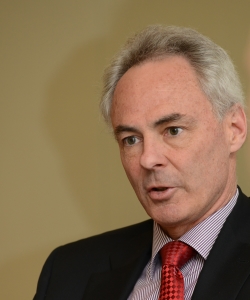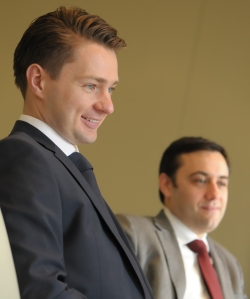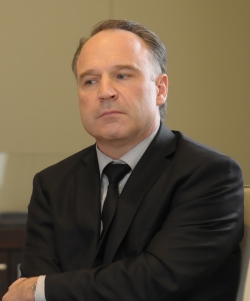This week's coverage of our U.S. equity roundtable concludes today with the managers discussing their investments in the technology, financial-services and health-care sectors.
Our panellists:
Michael Mattioli, managing director and portfolio manager at Boston-based Manulife Asset Management (U.S.), LLC. He is a member of the U.S. core-value equity team. The team's mandates include Manulife U.S. All Cap Equity.
Stephen Groff, principal and portfolio manager at Cambridge Global Asset Management, a unit of CI Investments Inc. Groff's roles include lead portfolio manager of CI Cambridge U.S. Dividend and CI Cambridge American Equity.
Jim Young, vice-president at Invesco Canada Ltd. He is responsible for Trimark U.S. Companies and Trimark U.S. Companies Class.
Glenn Fortin, portfolio manager at Beutel Goodman & Co. Ltd. Fortin is a U.S. equity specialist and a member of the firm's global equity team. The team's mandates include Beutel Goodman American Equity.
The roundtable was convened and moderated by Morningstar columnist Sonita Horvitch, whose three-part series began on Monday and continued on Wednesday.
Q: Let's discuss the U.S. information-technology sector.
Groff: I own Google's parent, ![]() Alphabet Inc. Class A (GOOGL) shares, in Cambridge American Equity. The Class A shares carry one vote per share.
Alphabet Inc. Class A (GOOGL) shares, in Cambridge American Equity. The Class A shares carry one vote per share.
 |
|
 |
|
| Jim Young | |
 |
|
 |
|
 |
Young: I own Alphabet too. It's a great search franchise. That's the key. I own both the Class A shares and the Class C, non-voting shares, which trade under the ticker GOOG. I've owned this company for a long time. Originally, there was only one class of shares. The new Class C shares were created as a stock distribution to existing shareholders.
Mattioli: I also own Alphabet, the Class A shares. This stock is trading at a valuation that we're comfortable with. Besides search, it's putting effort and capital into other ventures, such as self-driving cars. Google remains the big gorilla in Internet search and its service is good. Internet advertising is taking business away from other more traditional businesses such as TV and newspapers and the area is growing.
This will also help to drive ![]() Facebook Inc. (FB), which is a top-10 holding in Manulife U.S. All Cap Equity. Facebook has about 13% of the Internet advertising pie. We think that by year-end 2017, its share is going to be closer to 20% of this growing Internet advertising market. The valuation on this stock is about 75 cents on the dollar.
Facebook Inc. (FB), which is a top-10 holding in Manulife U.S. All Cap Equity. Facebook has about 13% of the Internet advertising pie. We think that by year-end 2017, its share is going to be closer to 20% of this growing Internet advertising market. The valuation on this stock is about 75 cents on the dollar.
Q: There are concerns that ![]() Apple Inc. (AAPL) is running out of creative steam. Stephen, Apple was a significant holding in Cambridge U.S. Dividend at the end of December.
Apple Inc. (AAPL) is running out of creative steam. Stephen, Apple was a significant holding in Cambridge U.S. Dividend at the end of December.
Groff: We own Apple because we think that there's more to the company than just the iPhone. There is a growing and profitable service business. Apple has a strong ecosystem. Customers are sticky. The company is putting a lot of money into research and development. It's unsure what products or services are going to stick, whether it's payments or auto or TV. The company is not a one-trick-pony hardware play. The stock is attractively valued. We don't think that Apple's earnings are peaking.
Mattioli: Apple is a holding in the fund. The company has pricing power. This probably has something to do with its ecosystem, which effectively locks in the user.
 |
|
 |
|
| Stephen Groff and Michael Mattioli | |
 |
|
 |
|
 |
Groff: The smartphone has become the centre of many peoples' lives. There's a strong franchise value in Apple. The company is becoming more shareholder-oriented.
Young: Apple is a significant holding in Trimark U.S. Companies. There is a pause, as the company is between upgrades on its iPhone. Investors underestimate the attractiveness of the smartphone market -- just the size of it -- one billion phones are sold a year. Apple has a 25% share of the market and I see that share growing. Apple is taking market share from Android. There's a three-year upgrade cycle for most people and this cycle is compressing. For all the reasons that Stephen mentioned, Apple is a highly attractive franchise and a huge cash-flow generator. It's a good total-return stock.
Mattioli: In summary, these consumer-related tech companies have built strong franchises. They're continually plowing back free cash flow into research and development and capital expenditure to advance their businesses.
Fortin: Beutel Goodman American Equity is more oriented toward software companies that are more directly aimed at the enterprise end of the spectrum. The portfolio has holdings in ![]() Amdocs Ltd. (DOX),
Amdocs Ltd. (DOX), ![]() Oracle Corp. (ORCL) and
Oracle Corp. (ORCL) and ![]() Symantec Corp. (SYMC). Once their software is entrenched in their customers' computer systems, there are extremely high switching costs. This creates a lasting foundation for the software providers to generate strong cash flow and high margins. These companies have strong balance sheets, with net cash. Over time, the companies have increased their returns to shareholders through dividends and share buybacks.
Symantec Corp. (SYMC). Once their software is entrenched in their customers' computer systems, there are extremely high switching costs. This creates a lasting foundation for the software providers to generate strong cash flow and high margins. These companies have strong balance sheets, with net cash. Over time, the companies have increased their returns to shareholders through dividends and share buybacks.
Q: Time to turn to the U.S. financial-services sector.
Mattioli: We like U.S. financials, particularly the large-cap U.S. banks. Valuations are attractive. ![]() Bank of America Corp. (BAC) and
Bank of America Corp. (BAC) and ![]() Citigroup Inc. (C) are top-10 holdings in Manulife U.S. All Cap Equity. Investment banker
Citigroup Inc. (C) are top-10 holdings in Manulife U.S. All Cap Equity. Investment banker ![]() Goldman Sachs Group Inc. (GS) is another top-10 holding. One of our favourite names is Citigroup. It comes down to valuation. Among the investment bankers, Goldman Sachs has a strong franchise. It's considered to be the bulldog of Wall Street. The stock also offers good value.
Goldman Sachs Group Inc. (GS) is another top-10 holding. One of our favourite names is Citigroup. It comes down to valuation. Among the investment bankers, Goldman Sachs has a strong franchise. It's considered to be the bulldog of Wall Street. The stock also offers good value.
Young: I am positive on the banks. They're well managed with great balance sheets and good diversification. I own ![]() Wells Fargo & Co. (WFC) in Trimark U.S. Companies. I've owned the stock for a long time. I also own
Wells Fargo & Co. (WFC) in Trimark U.S. Companies. I've owned the stock for a long time. I also own ![]() PNC Financial Services Group Inc. (PNC), a regional bank. One of the biggest holdings in the fund is the major global property and casualty insurer
PNC Financial Services Group Inc. (PNC), a regional bank. One of the biggest holdings in the fund is the major global property and casualty insurer ![]() Chubb Ltd. (CB). I owned Ace, which completed its acquisition of Chubb in January and merged with it. The combined company operates under the Chubb banner. The key to financials is good capital allocation and strong credit discipline. All three companies exhibit this. They've made acquisitions, built their franchises over time and have lots of surplus cash now.
Chubb Ltd. (CB). I owned Ace, which completed its acquisition of Chubb in January and merged with it. The combined company operates under the Chubb banner. The key to financials is good capital allocation and strong credit discipline. All three companies exhibit this. They've made acquisitions, built their franchises over time and have lots of surplus cash now.
| Citigroup Inc. | Chubb Ltd. | JPMorgan Chase & Co. | Wells Fargo & Co. | |
| Feb. 17 close | $39.78 | $116.91 | $58.77 | $48.13 |
| 52-week high/low | $60.95-$34.52 | $134.49-$94.35 | $70.61-$50.07 | $58.76-$44.50 |
| Market cap | $117.7 billion | $37.9 billion | $214.2 billion | $245.3 billion |
| Total % return 1Y* | -22.7 | 5.0 | 0.7 | -10.4 |
| Total % return 3Y* | -3.0 | 12.9 | 9.1 | 14.1 |
| Total % return 5Y* | -4.1 | 15.1 | 6.6 | 10.3 |
| *As of Feb. 17, 2016. All figures in U.S. dollars Source: Morningstar |
||||
Groff: The financials have a lot of levers under their control. They're taking excess capital and giving it back to shareholders. Expectations are very low. I have a small position in Chubb. A larger holding is ![]() U.S. Bancorp (USB). The stock is attractively valued. It's a well-capitalized bank with a diversified franchise. The low-interest-rate environment affects its operating leverage in the shorter term. Over time, USB should benefit from its scale, disciplined capital allocation and the improvement in a number of its key markets.
U.S. Bancorp (USB). The stock is attractively valued. It's a well-capitalized bank with a diversified franchise. The low-interest-rate environment affects its operating leverage in the shorter term. Over time, USB should benefit from its scale, disciplined capital allocation and the improvement in a number of its key markets.
Fortin: So many banks are so well capitalized. The stronger get stronger, you're seeing more acquisitions. ![]() JPMorgan Chase & Co. (JPM) is the largest financial holding in Beutel Goodman American Equity. JPMorgan is a classic world leader in financial services. It's good at managing risks. The valuation on the stock is low. Also, JPMorgan has been increasing its dividend. This speaks to its ability to return cash to shareholders. We also own Wells Fargo, which Jim spoke to, and a regional bank,
JPMorgan Chase & Co. (JPM) is the largest financial holding in Beutel Goodman American Equity. JPMorgan is a classic world leader in financial services. It's good at managing risks. The valuation on the stock is low. Also, JPMorgan has been increasing its dividend. This speaks to its ability to return cash to shareholders. We also own Wells Fargo, which Jim spoke to, and a regional bank, ![]() BB&T Corp. (BBT). BB&T has a strong track record of folding in acquisitions over time. The valuations on these financial stocks are compelling.
BB&T Corp. (BBT). BB&T has a strong track record of folding in acquisitions over time. The valuations on these financial stocks are compelling.
 |
|
 |
|
| Glenn Fortin | |
 |
|
 |
|
 |
Q: U.S. health-care stocks?
Mattioli: We are underweight health care. We're seeing more opportunities in consumer-discretionary stocks and financials. A health-care stock that we do own is ![]() Amgen Inc. (AMGN). The company has a diversified offering and the valuation on the stock is attractive.
Amgen Inc. (AMGN). The company has a diversified offering and the valuation on the stock is attractive.
Young: There's good and sustainable growth in health care. There's a reduced time to market for new products because of the advances in science. Demographics are a tailwind for the group. Biotechnology companies are key drivers of this sector. My biggest health-care holding in the fund is ![]() Celgene Corp. (CELG), a biotech company. Celgene has four products that drive its business and it has a large pipeline of new products, partly its own and, more importantly, as a result of 30 partners. Another holding is
Celgene Corp. (CELG), a biotech company. Celgene has four products that drive its business and it has a large pipeline of new products, partly its own and, more importantly, as a result of 30 partners. Another holding is ![]() Johnson & Johnson (JNJ).
Johnson & Johnson (JNJ).
Fortin: We own it too.
Young: Johnson & Johnson is a large, diversified health-care company that has been doing well with its pharmaceutical business, but its other two businesses -- consumer products and orthopedic devices -- look as if they're improving too.
Fortin: JNJ has such a large empire of assets. What attracts us to the stock, at present, is that management has been aggressive in the last few years in divesting assets that no longer fit the JNJ model. JNJ generates a huge amount of cash flow. In all, the health-care industry is highly concentrated, the end markets are growing, and their intellectual-property innovations give these companies pricing power.
Young: They have high margins and strong free cash flow.
Groff: We have little exposure to health care. It's a space that we're spending more time on.

Photos: Paul Lawrence Photography



















